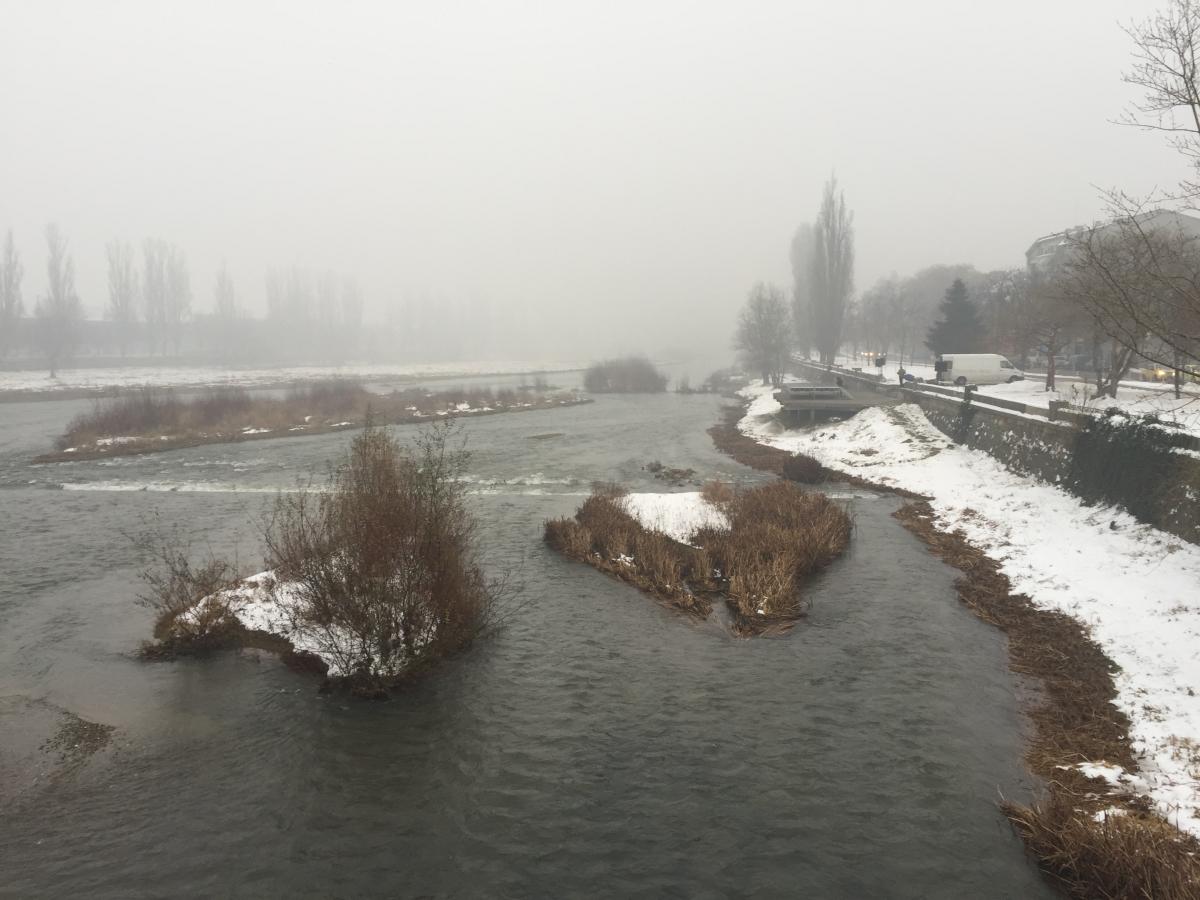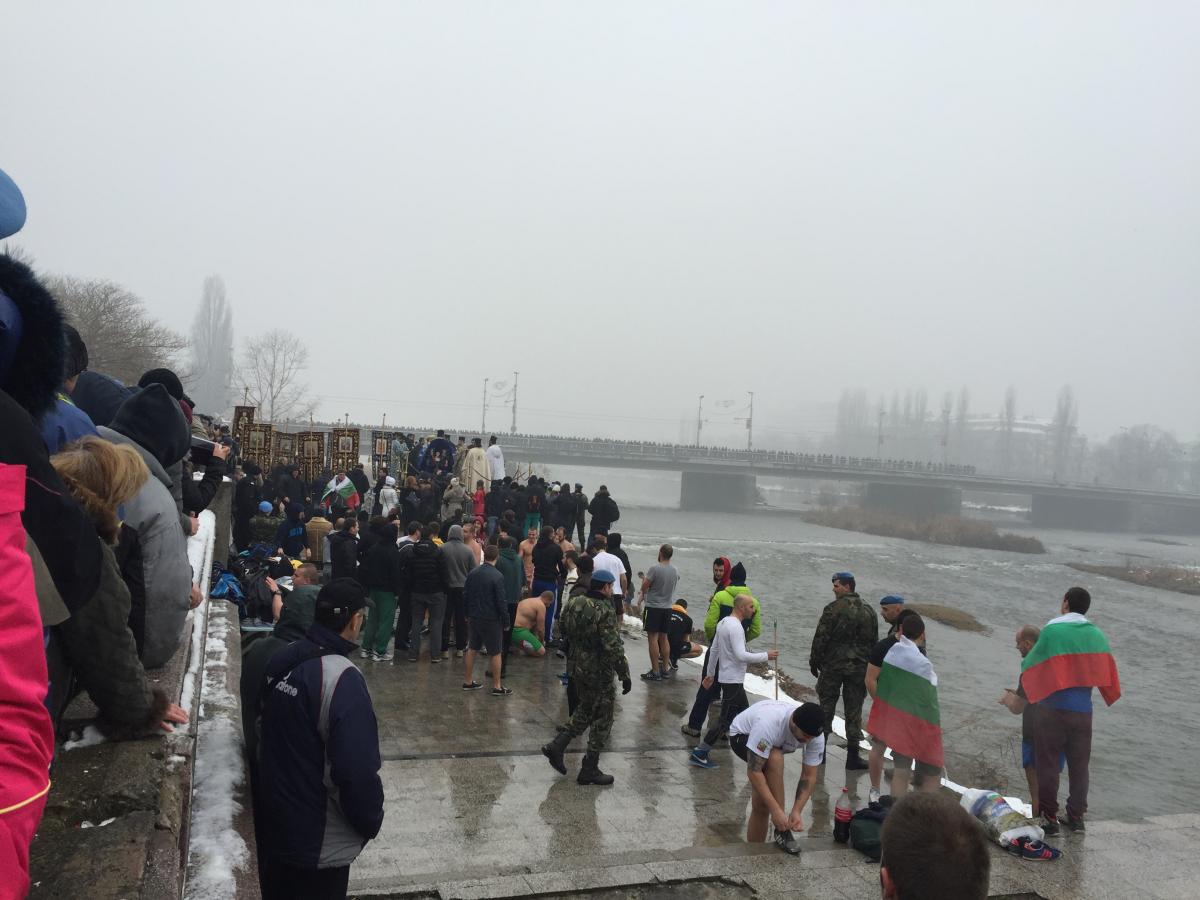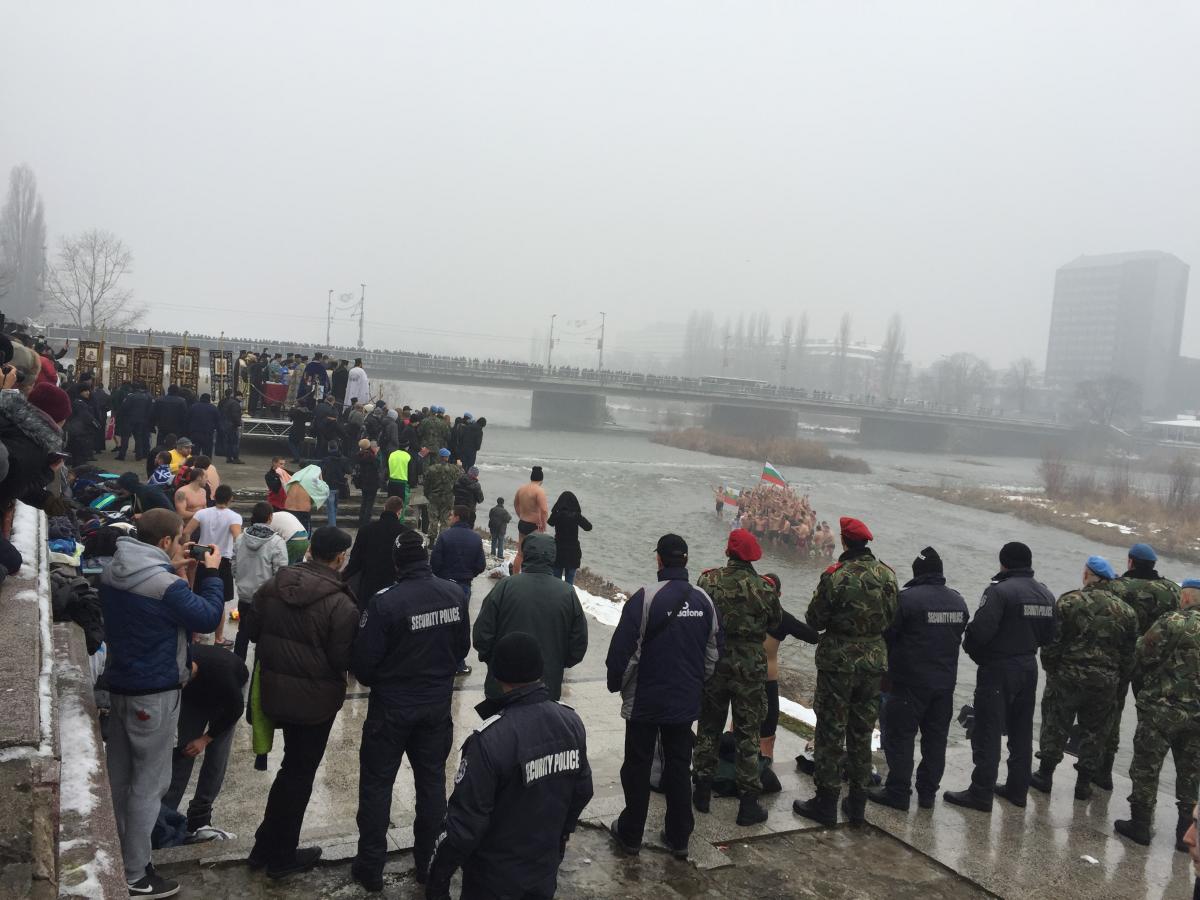
The email a contact had sent me about the event only specified that the ritual would take place sometime after 9:00, so I wrapped myself in several layers of clothing and walked to the Maritsa River, arriving there around a quarter to the hour. Though the temperature was above freezing, the air hovered unpleasantly between a mist and a drizzle. Visibility was just enough to see from one side of the river to the other. I found a platform on the south side and next to it a van with its flank open. From this, I assumed I was in the right place. As a former AV technician, I should have known as soon as I saw some men putting up speakers and mics that it would be at least another hour before the event would begin, but I was nervous that if I left and came back I would miss the whole thing.
Of course, the rational thing to do would have been to ask somebody, but since I didn’t know enough about the ceremony to know how big it would be or how welcome outsiders were, I didn’t want to announce my presence. So instead I just lurked around suspiciously for not one hour, but almost two. After the first hour, the toes on my right foot had gone numb. I had found an awning under which I could stand and read to pass the time, and I occasionally walked back and forth across the bridge to stay warm.
A couple of police cars arrived around 10:00, and I half-jokingly wondered whether somebody had reported an American spy creeping around. Maybe I would get whisked off to a dark cell for interrogation… Of course, nothing of the sort happened. I was just beginning what I believed would be a slightly longer walk (by this time my left toes were also numb) when a man walked past me with a Bulgarian flag wrapped around his shoulders. Though displays of nationalism like flag-waving and flag-wearing are more common here than in the parts of the US where I have lived, it is still not every day that you see a person walking around with a flag as a shawl. As discreetly as I could, I made an about-face and followed him back to the river. My suspicions were confirmed when I saw him climb down from the bridge to join a growing crowd near the platform.
Slipping and almost falling on some hard-packed snow, I found a place along a wall that paralleled the riverbank from which I hoped there would be a good view. Between trying to stomp feeling back into my feet (now all but completely numb) and trying not to breathe the air coming from the chain smoker standing immediately upwind of me, the last part of the wait was possibly the most grueling. As I watched, what must have been hundreds of people came and began to line the bridge. A few of them dumped the contents of plastic bags into the water – each had a small twig wreath and one or two round red things that floated. I haven’t yet been able to find out exactly what (or to whom) those offerings were.
Men and boys began to fill the area near the river and to place bags and clothing items on a row of tables designated for that purpose. After a while, a full-sized military band marched up and played a song. Behind them came a procession of priests and banners. The priests wore elaborately decorated robes and tall hats, and it was they who mounted the platform.
What I had expected to be a fairly solemn ritual, in which the men and boys would quickly strip off extra layers of clothing, step into the water on cue, catch the cross, and immediately emerge to dry off, was not solemn at all. If anything, it seemed to me to be a chance for the guys to show off how macho they were, how little the cold bothered them. There were about 40 participants, primarily in their 20s and 30s. Most of them were already in nothing but swim trunks when the priests arrived and began to chant. During the chanting, they approached the water and some appeared to play around in it. Several began rubbing snow over their bodies. I’m not sure if this was because the snow would have a numbing effect that would make the water seem more bearable, or if it was a way to show off. There were even a couple of bare-chested snowball fights.
Finally the moment arrived. The men clamored into the water, which was about a meter deep, and began doing a chant of their own. I’m not sure if it complimented the priests’ chant or if it was independent thereof. Two explosion sounds (some kind of imitation cannon blast) announced the moment the priest tossed the cross and the moment it landed in the writhing crowd, respectively. There was some splashing and struggling until one man held the artifact above his head: victory.
Some of the men immediately headed for the shore, which I originally thought was so they could dry off and warm up as quickly as possible. It may instead have been for the purpose of retrieving flags, because most of them returned to the water for frolicking, general merriment, brotherhood, and flag waving. There was a photo op when all of them climbed onto a small island not far from the riverbank.
The moment of the men’s chanting and the general lack of solemnity (the spectators were also fairly chatty) made me wonder just how spiritual/religious participants find the ritual. Or is that expectation of religious solemnity something that arises out of my own cultural biases? Would things have been different if I were in a small town or village rather than Bulgaria's second-largest city?
One of the things I found most interesting about the event was the juxtaposition of so many different elements: the band (military), the priests and the cross (religion), the men’s horseplay and macho-ness (performance of gender roles), the spectators (religion? entertainment? tourism?), the flags (nationalism), and the river (nature). What does it mean to have all of these things so obviously present? What does it say about certain Bulgarian traditions, history, and culture?

